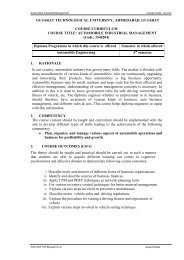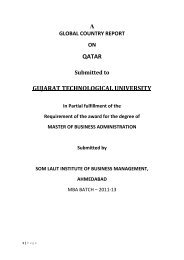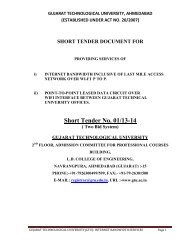708-Chaudhari Technical Institute, Gandhinagar - Gujarat ...
708-Chaudhari Technical Institute, Gandhinagar - Gujarat ...
708-Chaudhari Technical Institute, Gandhinagar - Gujarat ...
You also want an ePaper? Increase the reach of your titles
YUMPU automatically turns print PDFs into web optimized ePapers that Google loves.
views economic cooperation with India as an opportunity to diversify its<br />
commercial relations beyond those concentrated in China and the United<br />
States. A nation with a rapidly aging population, Japan can use investments in<br />
India to benefit from India’s highly educated and growing workforce. Japanese<br />
officials have also expressed admiration for India’s IT, pharmaceutical, and<br />
biotech industries. Tokyo has pledged to provide Delhi with a soft loan of $4.5<br />
billion to fund the first leg of the Delhi-Mumbai railway freight corridor, which<br />
will connect India's northern states with ports in the country's west. It also<br />
committed to supporting the rest of the corridor, which if completed would cost<br />
$90 billion and span six states. The Japanese government has also promised<br />
to encourage five Japanese companies to set up industrial bases along the<br />
corridor. The recent economic crisis has slowed the project and created talk of<br />
Japan revising its financial commitments downward. However, the rapid<br />
construction of the freight corridor would enhance India’s manufacturing<br />
industry while creating a real and enduring foundation for the India-Japan<br />
economic partnership. Private Sector Ventures: Beyond government<br />
initiatives, the India-Japan bilateral economic relationship is being enhanced<br />
by the integration of the nations’ private sectors. Japanese companies have<br />
made substantial investments in Indian industry. Mitsubishi financed a<br />
petrochemical plant in Haldia (near Calcutta). In June 2008, Japanese<br />
pharmaceutical company was due mainly to: increase substantial investments<br />
in Indian industry. Mitsubishi financed a petrochemical plant in Haldia (near<br />
Calcutta). In June 2008, Japanese pharmaceutical company Daiichi Sankyo<br />
bought a 34.8 percent controlling stake in India’s largest pharmaceutical firm,<br />
Ranbaxy Laboratories. A few months later, Japanese telecom giant NTT Do<br />
Como bought a 26 percent stake in Tata Teleservices Ltd. (TTSL).The flagship<br />
Japanese investment in India is stilcar manufacturer Maruti-Suzuki, which is<br />
celebrating its 25th year in India. The company sells one of every two cars<br />
sold in India, exemplifying the success of Japanese investors in India. More<br />
than 80 percent of Japanese companies in India are profitable and more than<br />
90 percent have expansion plans. According to Japanese embassy figures,<br />
the number of Japanese companies operating in India has increased from 260<br />
to 560 over the last two years. The Japan Bank of International Cooperation<br />
(JBIC) recently listed India as the number one country for strategic long-term.<br />
131
















